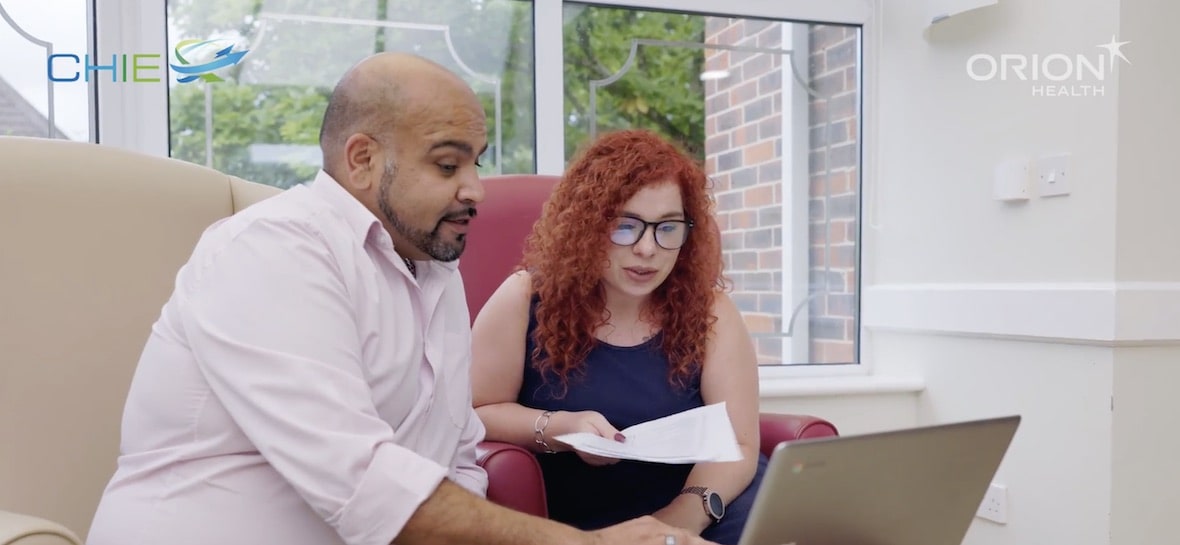Ian McCrae, Founder and Director of Orion Health, speaks to journalist Lyn Whitfield about the reforms needed in the NHS to make the service more integrated.
In this video filmed at The King’s Fund in London, Ian describes how experiences working across international healthcare systems and navigating recent serious illness have provided an unique perspective on what we need to do to get NHS tech reforms to stick.
Transcript:
Lynn Whitfield: My name is Lynn Whitfield, and I’m a journalist with a long-standing interest in healthcare technology. Today, I’m going to be talking to Ian McCrae. Who has asked me to describe him as the Founder, Executive Director and Mr odd Job at Orion Health. That absolutely doesn’t really convey the breadth of his vision. Ian built Orion Health from a company that has a home base in New Zealand and now works across the world. It has a presence in the Middle East, the US, Canada, and the UK, where it’s one of the major providers of shared care records and data services to the NHS. We’re going to be having a chat about some things that are going on in the NHS at the moment and where Ian thinks that the technology needs to develop and needs to fit. So, if we start with the NHS, from your international perspective, how do you think it’s getting on at the moment?
Ian McCrae, Orion Health: Well, you see, firstly, for me, Health was a little bit of an accident. I got a health project 35 years ago, and it was such an interesting, fascinating field that here I am today, still in healthcare. At Orion Health, we have a very interesting perspective as a company. Because we’re all over the world, as you mentioned, we’re in the Middle East, a very strong presence there, in Canada, the U.S, New Zealand, Australia and, of course, the NHS. So, we get to see a lot of the health reform programs that are going on around the world. To be fair, some of them are quite hard to understand.
We talk about standards; we should have a standard for the acronyms, and you guys all use. Every country seems to have a different set of standards. You’ve gone through a health reform here, and New Zealand has gone through health reforms recently. I’m on the record of saying, how can I put it, we could have done much better. Looking at your health reforms here, the way you have the ICSs, clustering of trusts, combining Social Services with health care services. That, to me, makes huge sense, and it is the future, and so, therefore, that is the future. Then the question is, what I.T. systems do you need to support that type of Health Care?
Lynn Whitfield:The reason you think that we’re going in the right direction, at least, is because you strongly believe, don’t you, that care used to be much more joined up for the patients, and it needs to be much more joined up across the system.
Ian McCrae: I think if you want to find out the problems in healthcare, the way to do it is to get a good grade four cancer, which I had, by the way. They did actually have a healthy health outcome, so far. Or have an elderly patient that you need to look after. Navigating the healthcare system is very hard, and it is not a good experience. I had a good health outcome because my family was hugely supportive, I tenaciously followed up on all my appointments, I even had to give a few of my providers bottles of wine, and I did actually have the resources to procure the extra services that I needed, but that shouldn’t be what you have to do to get good health care. It shouldn’t be like that.
Lynn Whitfield: So what type of IT do we need to make things better?
Ian McCrae: You’ve got to look at what the problem is. The problem is, today, most developed countries have a patchwork of providers. The person who is ill has to navigate through all of their providers. So, they need to be joined up. First of all, what a lot of the regions here are doing, and in other parts of the world, you need to pull together the medical record. So that all providers can see a common view of the patient’s healthcare. We also need to look at the workflow in healthcare. Having a GP appointment as the first port of call for any healthcare condition is illogical. We’re asking GPs to do things well beneath them, and so the first port of call clearly should be, well, a pharmacist can do, some people think, up to 70% of what a GP does. Care coordinators and nurses can do a lot of things that a GP can do. We need our professionals to be working at the top of their license. So therefore, if you’re going to do this, first, you need to have the medical record pulled together, and then you need to have a very good transfer workflow between all those different parties. And I personally believe, ideally, if they’re working for a single organisation, it would be quite beneficial, but it would require some fairly significant changes.
Lynn Whitfield: You have a concept, don’t you of the digital front door sitting on the front of this for the patient to go through?
Ian McCrae: Yes, so we have historically had what they call Patient engagement apps. Which might show you your lab results, perhaps your scripts and a few little bits and pieces. But generally, they aren’t very interesting and not very useful for the patient. Now I’ve got one of those. The big next generation of those products are called digital front doors, and a digital front door is a bit like banking. So instead of just providing your bank account details, it will allow you to do a lot of banking like services but for healthcare. For example, you can have an online consultation, you get your device data integrated into your medical record, sometimes symptom checking, but the interesting thing is as soon as you get these very, very rich, lots of data new medical records, the one little issue that occurs is too much data for humans to actually digest. So I am a latter-day convert to machine learning, chatGPT, that style of making suggestions to the physician. At the end of the day, the physician or the nurse has to make the final decision/call, but I am simply amazed at how clever some of that stuff is. I have used it a little bit to write the odd article, which I think is just a starter, Just to kick off the article, not to write the whole thing right, and that’s very good.
Lynn Whitfield: I think one challenge we come up against though, is we’ve heard a lot of these ideas over the years. You know, right back in 1998, we had an information for health strategy, we had NHS direct, we’ve had shared care records for quite a long time, and we’ve got lots of apps. Why is it so difficult to actually get this kind of reform to stick?
Ian McCrae: Well, you’ve asked the questions there. I think one of the problems the tech sector has, is we have looked to use technology to change Healthcare. Really, the changes to healthcare have to happen first, and technology is a supporting act. I mean, some vendors are out there suggesting that you put on their multi-million-dollar system, and it’ll reprogram your hospital. It doesn’t happen, and I think first of all you’ve got to envision, and as I said before, the best way to look at what sort of healthcare services we need is to get a good health condition yourself. Get a good chronic condition, which requires you to visit multiple providers and then you come to realise that most health systems are geared around the needs of providers, they’re not geared around the needs of patients unfortunately.




